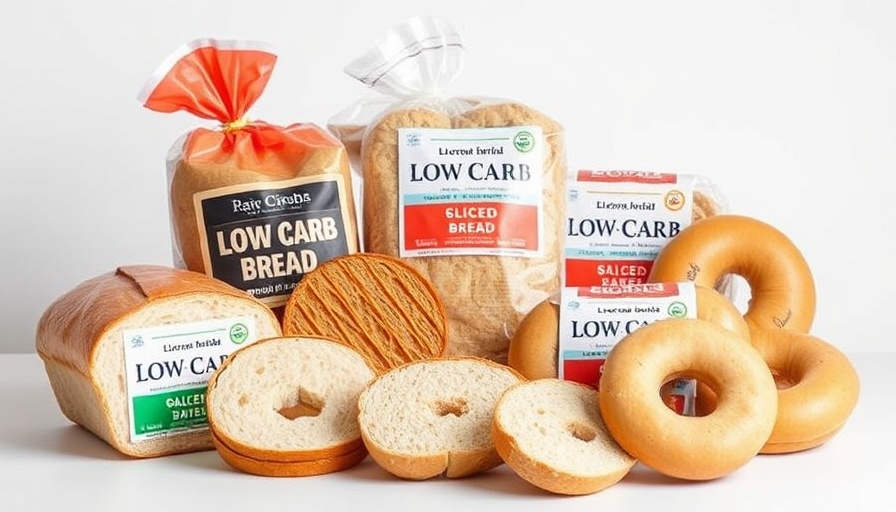
Embracing Carbs: Finding a Balance with Blood Sugar
Living with diabetes doesn't mean bidding farewell to all your favorite comfort foods. In fact, it's entirely possible to incorporate carbs into your meals while keeping your blood sugar levels stable. Understanding how your body reacts to carbohydrates is essential and discovering effective strategies can empower you to make informed decisions about your diet.
The Importance of Blood Sugar Management
Maintaining stable blood sugar levels is critical for overall well-being, especially for individuals with diabetes or associated conditions like high cholesterol or PCOS. Research suggests that frequent spikes in blood sugar can lead to fatigue and long-term health complications, making it crucial to find ways to keep these levels in check. Recognizing your personal threshold for blood sugar spikes often starts with becoming acquainted with your body's responses to food.
Understanding Glycemic Load: Portion Control Matters
The amount you eat often plays just as crucial a role as the types of food you choose. Focusing on glycemic load (GL) can give you an indication of how specific carbohydrate serving sizes will impact your blood sugar. Foods categorized as low in GL (under 10) require smaller adjustments, whereas high GL foods (20+) can send your blood sugar soaring. For instance, a standard slice of white bread has a high GL (~20), while sprouted grain options can sit below 10, making them a wiser choice while satisfying your sandwich cravings.
Choosing the Right Carbs: Quality Over Quantity
All carbs are not created equal. The glycemic index (GI) categorizes foods based on their immediate impact on blood sugar levels, providing insight into which options may be more suitable. For example, while consuming potatoes, opting for Yukon Golds with a GI of 58 instead of Russets at 95 can help in moderating spikes.
The Role of Fiber: A Hidden Hero
Incorporating more fiber into your meals is an excellent strategy for combating blood sugar spikes. Fiber-rich foods not only promote digestive health but also slow the absorption of sugar into the bloodstream. If you're looking for options, consider introducing lentils, chickpeas, and whole grains into your diet. These foods not only help maintain blood sugar levels but also contribute to feelings of fullness and satisfaction.
Mindfulness with Meals: Combining Strategies
Combining various strategies helps to maximize control over blood sugar. For instance, consider making a hearty lentil salad with roasted vegetables. The fiber from both lentils and vegetables, combined with a moderate serving of quinoa, creates a balanced meal that should keep your blood sugar at bay without sacrificing flavor.
Future Trends in Dietary Management for Diabetes
As awareness grows about metabolic health, more individuals are leaning towards flexible dietary approaches such as intermittent fasting or the keto diet. While these diets offer various benefits, understanding how they affect blood sugar management is vital, particularly for those with diabetes or insulin resistance. Engaging with a healthcare provider for personalized advice can ensure you’re making choices that align with your health goals.
Common Misconceptions about Carbs and Diabetes
One prevalent myth is that all carbohydrates should be avoided when you have diabetes, but this is simply not true. Carbohydrates are an essential source of energy. Instead of a blanket restriction, the focus should be on making smarter choices, portion control, and timing of carbohydrate intake to minimize spikes.
Your Path Forward: Practical Steps to Consider
As you consider your dietary approach, start documenting how your body responds to different foods. Tracking your meals alongside blood sugar reactions can clarify the most effective strategies for you. Additionally, experimenting with meal timing, such as incorporating more carbs during periods of physical activity, can shift your understanding of dietary management.
Living with diabetes involves continual learning and adaptation. By approaching food with intention and knowledge, you can enjoy the flavors you love without jeopardizing your health.
Call to Action: Take control of your health today by exploring various dietary strategies and tracking how they affect your blood sugar. Engage in discussions with healthcare professionals and peers to discover what works best for you!
 Add Row
Add Row  Add
Add 



Write A Comment